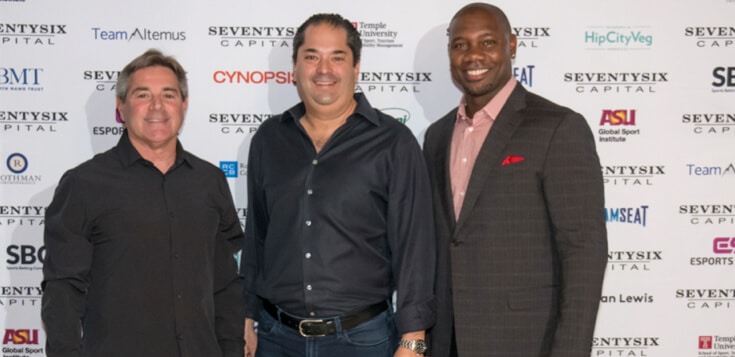Ryan Howard couldn’t have asked for a more spectacular beginning to his Major League Baseball career. He was the National League Rookie of the Year in 2005, the MVP in 2006, had a starring role on the 2008 Phillies team that brought Philadelphia its first championship in any of the major sports in 25 years, and became the fastest player ever to rack up 100 homers, 200 homers, and 1,000 RBIs.
But he also experienced his fair share of lows as his career wore on. Howard suffered a torn Achilles tendon in 2011 as he made what would be the final out of the Phillies’ five-year playoff run, endured protracted slumps that the Philadelphia fans did not always observe silently, and got benched for part of a final season in Philly that saw his batting average end up four points south of the Mendoza line.
The wild swings of that career taking, well, wild swings are behind Howard now. He’s one year removed from his official retirement from baseball, and in one week, on Nov. 19, “The Big Piece” will turn the big four-oh.
He’s moved on to a role on ESPN as a Baseball Tonight analyst, he’s a founding partner in the venture capital firm SeventySix Capital (pictured above with partners Jon Powell and Wayne Kimmel), and he and his wife expanded their family in 2019.
“I’m not a big sports betting guy, but to me, life itself is kind of a bet,” Howard told PennBets last week in a one-on-one interview during SeventySix Capital’s Sports Innovation Conference & Pitch Competition at the first baseman’s old stomping grounds, Citizens Bank Park. “I’m not big on going to the sportsbooks and betting. My bets are different. My bets are, like, buying a house or buying a car and hoping that when I go to sell it, I can make some more money off it.”
Focused on line drives, not driving lines
Howard’s baseball career ended before legal sports betting began to spread outside of Nevada, and like many other professional athletes from his era, he says most of the players knew very little about sports gambling.
“Obviously, you know that there are people out there that gamble, but in terms of what we were doing on the field, you never thought about that,” he said. “We all knew about Pete Rose, of course, and I think that was kind of a scared-straight type situation, at least for me.”
Howard suspects that level of ignorance among players is in rapid decline now.
“With all the media outlets and social media talking about sports betting, it’s hard not to know about it,” he said. “More players are getting involved. They’re not betting on their own sport, obviously, but they may be betting on other sports, and they may be in fantasy leagues and that sort of thing.”
Will Rose get into the Hall?
Howard mentioned Rose, the all-time hit king who, like him, won a World Series ring playing first base in Philly. During last Wednesday’s sports business event at the ballpark, Phillies VP of Marketing and New Media Michael Harris noted, “Baseball and betting have a long, complicated history.”
Between the 1919 “Black Sox” scandal and Rose’s lifetime ban for betting on baseball, that they do.
With MLB now embracing sports betting and making deals with operators, some have wondered if Rose’s chances of getting into the Baseball Hall of Fame are improving.
“I don’t think he’ll get in while he’s alive,” Howard opined. “But about his betting, I know he did it as a manager, and I don’t think he was ever going to get put into the Hall of Fame as a manager. To me, based on what he did as a player, he should be in the Hall of Fame. I think everybody understands that his accomplishments are worthy of the Hall of Fame.”
(Reports have come out in recent years indicating that Rose bet on games when he was a player also, but he has continued to deny that.)
Howard made clear that even though he supports Rose’s Hall of Fame case, he doesn’t think what the 17-time all-star did is OK.
“He was in a position to have an impact on the outcome of games,” Howard said. “There was a lack of integrity, with him being a manager and placing a bet and putting out a lineup card. And it shouldn’t really change anything that MLB is now partnered with companies in the sports betting realm.”

Rise of the machines
Even though it’s only been three years since Howard played his last major league game, baseball isn’t quite the same sport it was in his day.
Howard finished his career with 382 homers (69th all-time), 709 walks (359th all-time), and 1,843 strikeouts (15th all-time), to go with a .258 batting average. In the current “three true outcomes” era, where the focus is on slugging percentage and on-base percentage and fewer people are talking about batting average, Howard might have been perceived as more valuable. (And we’re talking about someone who was perceived as plenty valuable in his prime, finishing in the top five of the MVP voting four seasons in a row and in the top 10 six times in a row.)
New statistics and new strategies are constantly reshaping the game. Howard jokingly refers to himself as “the Biggie Smalls or Tupac of the infield shift movement.”
Instant replay has also been a major change — and one that is a positive for that “integrity” that is so critical to the sports betting component. The games may be even longer now, yes, but the calls of fair or foul and of safe or out are almost always right.
But MLB will never escape the ire of fans and bettors as long as umpires are calling balls and strikes, each with their own personal strike zones and questionable perceptions.
When it comes to human umps, ESPN’s K-Zone has put a frame around the picture of inconsistency. Are so-called “robot umps” far off?
“I just saw an article the other day where it said they’ve been testing it in the Arizona Fall League, and it’s going to be in some parks in 2020 in the minor leagues,” Howard said. “I think if it’s a success in the minor leagues, eventually it will make its way to the major leagues — because these kids that have been coming through the minor leagues, that’s what they’ll be used to using as their strike zone.
“It’s going to be a work in progress, trying to figure it out. Ultimately it’s about getting the calls right and having that consistency.”






